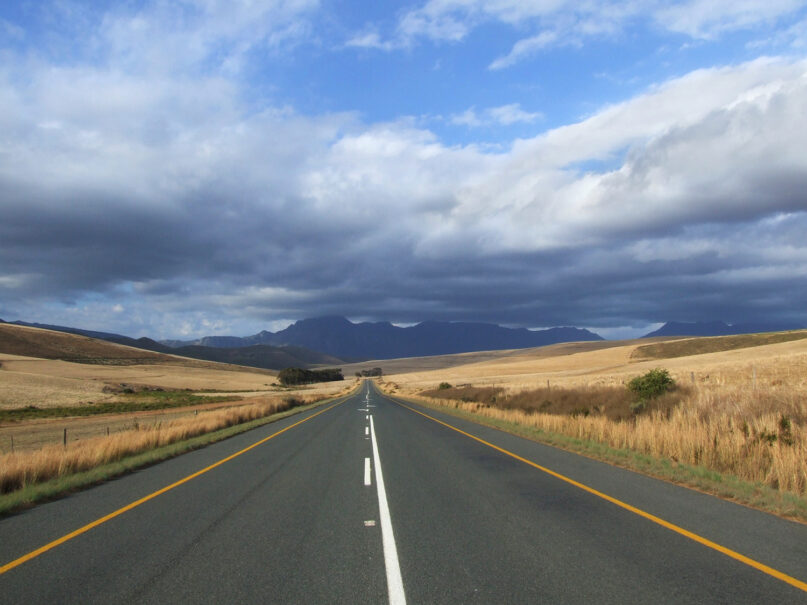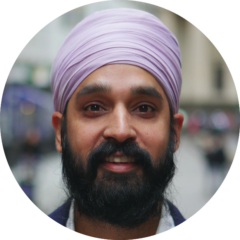(RNS) — I go to get our car washed. It’s a rural area. We know by the Trump flags outside the homes that there are many conservatives here. My wife and I enjoy the area, but because we look different — especially me, in a turban — we’re not always comfortable. “What do people think about us?” we often wonder. “Are we safe?”
I walk into the waiting room at the car wash. Two white men are on the couch, watching Fox News. They say good morning. I say hello, sit on a chair and take out my book.
They talk about how nice it is to see Fox News being shown in public. About how so many people are deluded by fake news. About how even some of their friends have been brainwashed by other news channels.
“If only I could show them the truth,” one says. “If only they could see what we see.”
I keep my nose in my book, head down.
A worker comes in and calls for a Ford F150. The two shake hands and say goodbye. Now it’s just me and the other guy. I really hope he doesn’t ask what I think.
He’s quiet for a minute or two, but then he can’t help himself. “So what do you think? Is our country falling apart?”
I don’t want any drama, so I shrug and give the most generic answer I can. “Seems like it, doesn’t it?”
He agrees, of course, and starts talking about his grandchildren. He talks about how sad it is that they have to grow up in a country being afraid of other people. How our country could be so much better if we took care of one another.
This is what I think, too. I think of it a lot as a father. How can I make this place more safe and more comfortable for our girls?
But I’m surprised by this connection. We see the world so differently. But our motivations are so human. And our most basic impulses as fathers? That’s precisely what we share.
We talk for a few more minutes, him about his grandchildren and how much he enjoys that part of his life. Me about my own kids and what I’m doing to prepare them for this world. He gives me a bit of advice, and once again, I’m surprised that it’s actually resonant with how I see the world.
“Protect them from the hard stuff, but don’t overprotect them,” he tells me. “We grow a lot through difficulty.”
A worker comes in and hands him his keys. We say goodbye and wish one another luck, our mutual discomfort resolved through a moment of connection.
I didn’t make much of this interaction. I’ve had many like this in my life, gentle reminders that those we see as our opposites never are and that seeing someone as a stranger can change in a moment.
In retrospect, I see that interaction as preparation for the week that would follow, a week during which I would interact with more conservative Christians than at any other point in my life since my visit to a megachurch in Texas.
First, I participated in this year’s International Religious Freedom Summit, an invention of the Trump State Department that is now sponsored independently. I was invited to moderate the opening plenary conversation on the first day of the summit alongside Tony Perkins, president of the Family Research Council, the conservative Christian lobbying group. Perkins and I interviewed U.S. Reps. Michael McCaul, a Texas Republican, and Jim McGovern, Democrat of Massachusetts.
What people saw on stage was the coming together of four people with very different views and convictions, all there to discuss their views on religious freedom and religious persecution.
What struck me was the degree to which the four of us, with varying perspectives and worldviews, found common ground on some key aspects of basic human rights. As McGovern noted, it’s remarkable how much we agreed on this topic, given that the four of us couldn’t even agree on lunch.
What people didn’t see was that the respect and civility showcased on stage was not just performative; this was the decorum of our interactions backstage in the green room, too. I met with my co-panelists and their staffs, and we exchanged pleasantries before our program. After our session, we took a few moments to get to know one another a bit more.
These are not connections I would have made otherwise. In important ways the conservatives I met could be regarded as my exact opposites, and our conversations were less than comfortable. To be honest, talking with them felt at times like taking medicine. But I knew they were good for me, emotionally and spiritually.
Mind you, our conversation was brief and stayed near the surface: family, hometown and even a bit on faith. But just like at the car wash a few days before, I felt my heart soften and expand.
People ask me why I put myself in these positions of discomfort and uncertainty. This is what I’ve learned. It’s so easy to judge people who are different from us, to assume the worst about them, or to at least assume that they’re nothing like us. And the more we stay in our bubbles, the easier it becomes to hold that ground — and the more distant we become from one another.
I’m not saying we need to do it all the time, nor am I saying we should ignore our discomfort. Everything in moderation, as they say. But I do appreciate the opportunities I’ve had this past week to grow through interactions with people I view as very different from me.
While some of those differences still feel stark and irreconcilable, I’m reminded that, in a way, none of us is so different in the end.






